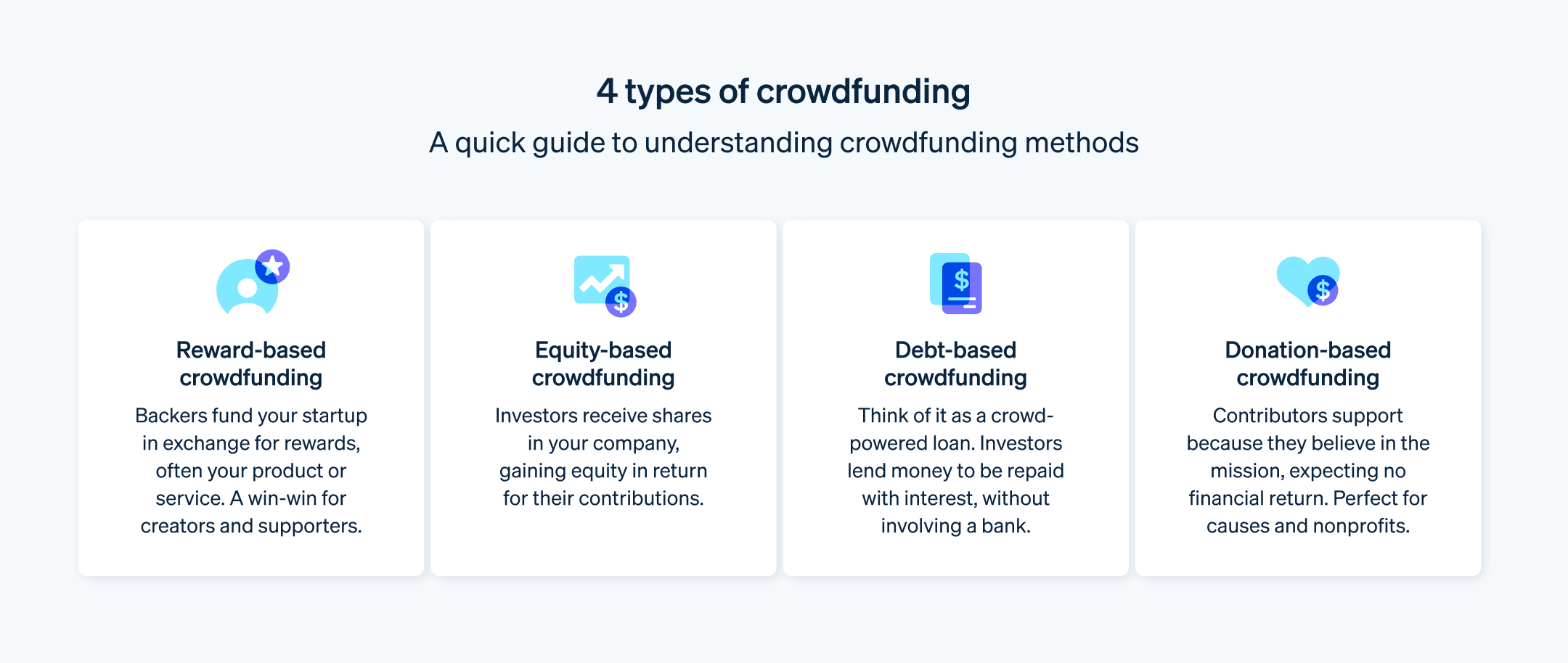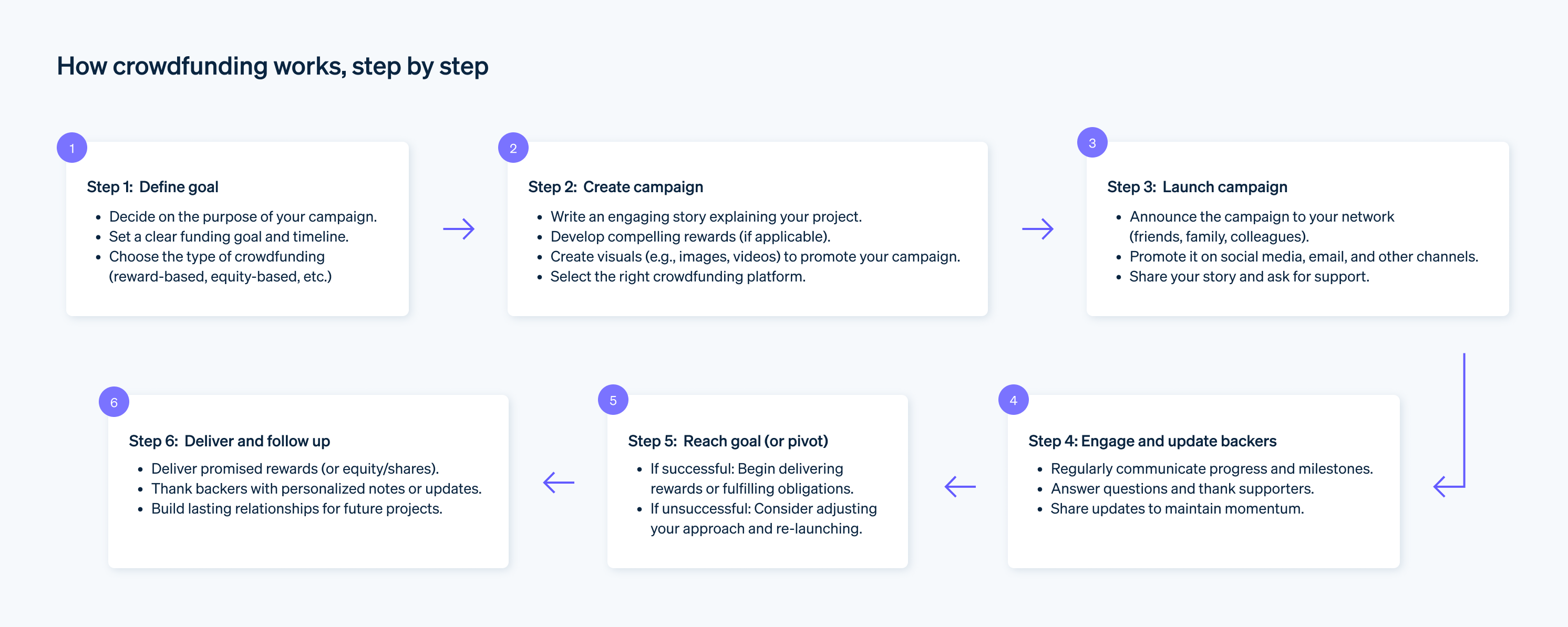寻找资金具有挑战性,但对初创企业来说很有必要。当今的企业家可以使用多种资金来源。众筹在过去十年中越来越受欢迎,它使融资过程民主化,并在传统融资方式可能不足的地方提供了获得资金的途径。据估计,截至 2023 年,全球众筹市场价值超过 14 亿美元,预计到 2030 年这一数字将翻一番。Kickstarter 是一个领先的众筹平台,截至 2023 年 5 月,该平台已经托管了超过 592,000 个项目。
众筹以其多功能性和影响力而著称,使企业家能够从广大受众那里筹集资金。除了获得必要的财务资源外,众筹还可协助初创企业获得宝贵的市场验证,建立早期支持者社区,并为潜在客户、早期采用者甚至投资者建立一个令人激动的互动平台。
下面,我们将讨论主要众筹类型的特点、优点和缺点。了解这些不同的形式是确定众筹是否可作为为您的初创企业提供资金的正确策略的第一步。
目录
- 什么是众筹?
- 众筹对企业有什么好处?
- 众筹的类型
- 奖励型众筹
- 股权型众筹
- 债务型众筹
- 捐赠型众筹
- 奖励型众筹
- 如何选择使用哪种类型的众筹
- 众筹的替代方案有哪些?
什么是众筹?
众筹是一种通过朋友、家人、客户、个人投资者和其他人的集体努力筹集资金来资助项目和企业的方式。这种方式依赖于一大批个人的共同努力 — 主要是通过社交媒体和众筹平台在线进行 — 并利用他们的网络获得更大的影响力和曝光率。
众筹与传统的融资方式相反,传统的融资方式是一个项目或企业向一小部分特定的个人或机构筹集资金。相反,众筹允许您通过对您的项目或企业感兴趣的个人投资者(包括任何愿意出钱支持您的项目或企业的人)筹集资金。根据项目或业务的性质和潜在回报,这些捐款的数额可以很小,也可以很大。
通过众筹,企业家或项目发起人可以利用互联网的影响力为各种目的筹集资金,如创业、开发新产品、支持社会事业或帮助有需要的个人。
众筹对企业有什么好处?
众筹是初创企业筹集起步或发展业务所需资金的一种创新方式。通过向群众筹资,初创企业可以获得资金以外的各种额外好处。
互联网和社交媒体的兴起使得接触大量潜在投资者和支持者比以往任何时候都更容易,每个人都可为融资目标贡献少量资金。这种方式不仅使投资过程更加便捷,还为初创企业带来了一些明显的优势。
以下是一些主要优势:
获得资本
众筹为初创企业提供了可能无法从传统资金来源(如银行或风险投资家)获得的资金。市场验证
通过向公众展示您的想法,您可以衡量他们的兴趣,看看您的产品是否是人们真正想要的。成功的众筹活动可以证明人们对您的产品或服务有需求,并为其他投资者和利益相关者提供概念验证。积累受众
众筹活动可让您接触到大量有助于提升您的知名度的人群,并建立受众群体。那些为您的活动做出贡献的人可能会成为您最热情的客户和直言不讳的拥护者。反馈和见解
通过众筹过程,您可以在产品或服务正式推出之前获得相关反馈。支持者可以提供有价值的见解和改进建议。降低风险
与传统的融资方式相比,众筹的风险更小。您没有放弃股权或承担债务;相反,您是在用自己的产品或服务来换取资金。宣传与营销
成功的众筹活动可以通过社交媒体的分享和点赞以及传统媒体的报道带来巨大的宣传效果。合作和交流机会
众筹活动经常吸引行业领袖、潜在合作伙伴甚至其他资金来源的注意。这种知名度可促成战略合作伙伴关系和进一步的投资机会。
众筹的类型
初创企业可以选择四种主要类型的众筹,每种类型都有独特的优势和更适合支持的特定用例。以下是初创企业需要了解的概述:

奖励型众筹
在奖励型众筹模式下,支持者为您的初创企业提供资金以换取“奖励”,通常是您公司提供的产品或服务。推出新产品或服务并需要为开发或生产融资的初创企业通常使用此模式。奖励型众筹平台的例子包括 Kickstarter 和 Indiegogo。
奖励型众筹是一种流行的筹资方式,尤其是适用于创意项目或新产品发布。以下是一些主要的优点和缺点。
奖励型众筹的优点:
不牺牲股权:与股权型众筹不同,奖励型众筹不涉及放弃公司的所有权。
市场验证:奖励型众筹可让您评估市场对您的产品或服务的兴趣。如果您的活动取得成功,就说明您所销售的产品有市场。
售前和营销:众筹活动也可以作为产品的预售,产生宣传效果并提供初始客户群。
社区建设:众筹平台提供了一种与支持者沟通和互动的方式。这有助于建立一个支持者社区,他们可能会帮助传播您的产品或服务。
奖励型众筹的缺点:
全有或全无融资:许多众筹平台采用“全有或全无”的方式运作,这意味着如果您没有达到筹资目标,将得不到任何资金。这种情况并非总是如此,但并不少见。
兑现奖励:兑现承诺的奖励很重要,这可能比预期的更耗时或更昂贵。不履行奖励可能会导致声誉受损,甚至让支持者有理由要求退还他们的资金。
成功与否不可预知:并非所有活动都能成功,即使您的想法是好的。成功可能取决于许多因素,包括活动的质量、时机和纯粹的运气。一家初创企业可能会投入大量时间发起一项活动,但结果却一败涂地。此外,以失败告终的活动可能会让创始人错误地认为他们的商业理念不可行或市场需求不旺盛。
公开曝光:您的想法是公开分享的,这可能会被其他人复制。您需要在宣传需求和过多披露的风险之间取得平衡。
费用:众筹平台通常会从筹集到的资金中收取一定比例的费用,而且还可能收取额外的手续费。
股权型众筹
在股权型众筹模式下,支持者获得您公司的股份以换取他们的投资。这种形式的众筹最常被具有高增长潜力的初创企业使用,因为这允许他们筹集更多的资金,以换取公司未来利润的股份。SeedInvest 和 CircleUp 是流行的股权众筹平台。
股权型众筹的优点:
大额资本:由于投资者购买的是公司未来成功的股份,因此他们可能愿意提供比奖励型众筹更多的资金。这可以使初创企业筹集大量资金。
长期投资者关系:奖励型众筹中的投资者关系通常在奖励兑现后就结束了,而股权型众筹则不同,它可以与投资者建立长期关系,因为投资者对公司的持续成功有着既得利益。
获得专业知识和网络:投资者通常会带来自己的专业知识、经验和网络,这对早期公司来说可能是宝贵的资源。
股权型众筹的缺点:
所有权丧失:通过提供您公司的股权,您将放弃部分所有权,这可能意味着分享控制权和决策权。
监管复杂性:与其他形式的众筹相比,股权型众筹需要遵守更复杂的法律法规。这可能需要法律顾问,并可能产生大量的法律费用。
报告要求增加:拥有众多股东的公司通常需要定期向投资者提供最新信息和财务报告。这可能非常耗时,并需要额外的行政资源。
回报压力:奖励型众筹的支持者乐于接受产品或服务,而股权投资者则不同,他们寻求投资的经济回报。这会增加公司的业绩和回报压力。
稀释的可能性:如果将来您筹集到更多股权资金,早期投资者(包括众筹投资者)所拥有的公司股份比例可能会被稀释。如果处理不当,这可能会导致投资者不满。
债务型众筹
债务型众筹也称为“点对点借贷”或“P2P 借贷”,与传统贷款类似。您不是从银行那里获得贷款,而是从一群投资者那里获得贷款。初创企业同意在规定时间段内连本带息偿还贷款。LendingClub 和 Prosper 是知名的债务型众筹平台。
债务型众筹的优点:
所有权保留:与股权众筹不同,在债务型众筹模式下,您不必放弃公司的任何所有权股份。一旦贷款还清,您对投资者的义务就结束了。
更快的流程:通过债务型众筹获得贷款的过程可能比通过传统银行更快。资格要求也可能不那么严格。
固定还款时间表:您将有一个固定的还款时间表,这可能比股票投资的不可预测性更容易计划。
成本可能更低:根据您获得的利率和贷款期限,债务型众筹有时可能比股权型众筹或其他类型的贷款更实惠。
债务型众筹的缺点:
还款义务:与其他形式的众筹不同,您通过债务型众筹筹集的资金必须连本带利偿还。无论您的企业经营状况如何,这都是您需要规划的固定支出。
利息成本:贷款成本不仅包括借款本金,还包括贷款期间的利息。
信用评分风险:如果您无法偿还贷款,您的信用评分可能会受到影响,从而影响您今后获得融资的能力。
抵押贷款风险:一些债务型众筹可能需要抵押品或个人担保。如果贷款无法偿还,您将面临失去抵押资产的风险。
捐赠型众筹
非营利组织、社会企业家和初创企业通常采用这种模式,其“投资回报”不是经济回报,而是社会公益或某种形式的社区利益。支持者向该项目捐款是因为他们相信这项事业,而不是期待获得经济回报。GoFundMe 是一个知名的捐赠型众筹筹款平台。
捐赠型众筹的优点:
无需偿还或股权交换:支持者把钱捐赠给您的项目或事业,因此您不必担心偿还贷款或放弃业务份额。
支持社会事业:捐赠型众筹对于关注社会、慈善或社区的项目或事业尤为有效。人们通常愿意捐款来支持他们关心的事业。
社区参与:这种形式的众筹非常适合建立一个支持者社区,让他们对您的项目或事业投入感情。
捐赠型众筹的缺点:
吸引力有限:捐赠型活动通常依赖于项目或事业的情感吸引力,这可能会限制它们对更广泛受众的吸引力。对于商业项目来说,这些活动可能不太成功。
缺乏有保障的资金:与其他形式的众筹一样,不能保证一定能达到融资目标。在某些平台上,如果您没有达到目标,您将得不到任何资金。
公开曝光:与其他形式的众筹一样,您的想法是公开的,这可能会被其他人复制。
平台费用:虽然您筹集的资金无需偿还,但大多数平台会根据您筹集的资金数额收取费用。
如何选择使用哪种类型的众筹
为您的初创企业选择合适的众筹类型很大程度上取决于企业的性质、目标以及能否满足每种众筹方式的要求。以下是做出决定时需要考虑的一些因素:
企业或项目的性质
如果您要推出新产品或服务,奖励型众筹可能最适合您。如果您的企业有强烈的社会或社区使命,那么捐赠型众筹可能是一个不错的选择。如果您的企业已经有了一定的规模,而且您愿意放弃股权,那么股权型众筹可能是最好的选择。如果您对自己偿还贷款的能力有信心,并希望保持对公司的完全所有权,那么债务型众筹可能是最佳选择。财务需求和目标
不同的众筹方式可以产生不同数额的资金。如果资金数额较大,股权型众筹或债务型众筹可能更适合。如果您需要的金额较小,奖励型或捐赠型众筹可能就足够了。市场验证
如果您需要在市场上测试产品,奖励型众筹可以提供宝贵的客户反馈和验证。所有权和控制权
如果保持对初创企业的完全控制和所有权对您来说很重要,那么奖励型众筹、捐赠型众筹或债务型众筹将比股权型众筹更可取。履行义务的能力
对于奖励型众筹,您能否及时生成和提供奖励?对于债务型众筹,您有信心偿还贷款吗?对于股权型众筹,您能否管理众多股东?法律和监管考虑
与奖励型或捐赠型众筹相比,股权型和债务型众筹可能涉及更复杂的法律和监管要求。确保您了解这些义务。

众筹的替代方案有哪些?
初创企业有几种众筹选择,可以分为两大类:债务融资和股权融资。
债务融资
- 银行贷款:传统的银行贷款是初创企业的常见融资方式。他们通常需要可靠的商业计划和抵押品。
- 信用额度:银行或信用合作社也提供信贷额度,使企业能够灵活地获得资金。
- 小额贷款:非营利组织和网上贷款机构提供的贷款规模较小,通常比传统银行贷款更容易获得,尤其适合信用记录较差的企业。
股权融资
- 天使投资人:天使投资人是将个人资金投入初创企业以换取股权的富裕人士。他们还可以提供专业知识和行业人脉。
- 风险投资家 (VC):VC 投资于他们认为具有高增长潜力的初创企业和早期公司。作为回报,他们通常要求获得股权,并往往要求对公司有一定程度的控制权。
- 私募股权公司:这些公司对成熟公司进行投资,目的是提高其价值,然后出售获利。它们通常要求大量股权或完全所有权。
除了债务融资和股权融资外,以下是初创企业为其运营融资的其他常见方式:
补助金
政府机构、基金会和公司的赠款是无需偿还的免费资金。它们可以成为重要的资金来源,但通常竞争激烈,可能需要满足某些条件。自筹资金
许多企业家最初都是自掏腰包创业。这可能涉及储蓄、信用卡或房屋净值贷款。亲朋好友
企业家通常会向亲朋好友寻求资金支持。虽然这不失为一种起步的好方法,但重要的是要将其视为一种商业交易,以避免误解和关系紧张。企业加速器和孵化器
这些项目为初创企业提供资金、指导和资源,通常以少量股权作为交换。战略合作伙伴关系
一些初创企业与大型企业建立战略合作伙伴关系,以提供资金和资源换取有价值的东西,如获得创新技术或进入新市场。
众筹只是初创企业众多融资方式中的一种,大多数初创企业并不完全依赖于一种融资方式。确保您了解每种方法的优缺点,并选择最适合您的业务模式、财务需求和长期目标的方法。
Stripe Atlas 如何提供帮助
Stripe Atlas 可为贵公司搭建法律架构,助力在两个工作日内从全球任何地点完成融资、开设银行账户及接收付款。
已有超 7.5 万家公司通过 Atlas 完成注册,其中包括获 Y Combinator、a16z 与 General Catalyst 等顶级投资机构支持的初创公司。
申请使用 Atlas 注册公司
通过 Atlas 申请注册公司仅需不到 10 分钟。您可自主选择公司架构,即时核验公司名称是否可用,并可添加最多四位联合创始人。您还需确定股权分配方案,预留一定比例的股权供未来投资者与员工认购,指定公司管理人员,并通过电子签名完成所有文件签署。所有联合创始人也将收到邮件邀请,通过电子签名签署其对应文件。
在获取雇主识别号 (EIN) 前开通收款和银行服务
完成公司注册后,Atlas 会为您申请雇主识别号码 (EIN)。持有美国社会保障号、美国地址及手机号码的创始人可享受美国国税局 (IRS) 的加急处理服务,其他创始人则需通过标准流程申请,耗时可能稍长。此外,Atlas 支持在 EIN 下发前进行收款与银行开户操作,让您在 EIN 获批前即可开始收款并完成交易。
无现金创始人股权认购
创始人可使用知识产权(如版权或专利)而非现金认购初始股份,相关认购凭证将存储在 Atlas 管理平台中。使用该功能需满足知识产权估值不超过 100 美元的条件;若您持有的知识产权价值高于此限额,请在操作前咨询专业律师。
自动提交 83(b) 税务申报
创始人可通过提交 83(b) 税务申报降低个人所得税负。无论您是美国籍或非美国籍创始人,Atlas 均可代为完成申报流程——采用 USPS 认证邮件寄送并附带物流追踪服务。您可直接在 Stripe 管理平台获取已签收的 83(b) 申报表及官方寄送凭证。
全球顶尖水准的公司法律文件
Atlas 为您提供创办公司所需的全部法律文件。Atlas 的 C 类公司文件由全球顶尖风投律所美国科律律师事务所 Cooley 联合设计,旨在助您立即启动融资,并确保公司获得全方位法律保护,涵盖股权架构、权益分配及税务合规等核心领域。
Stripe Payments 服务首年免费,更享价值 5 万美元的合作伙伴专属优惠与折扣
Atlas 与顶级合作伙伴深度联动,为创始人提供独家优惠与资源支持,涵盖 AWS、Carta、Perplexity 等行业领军企业的工程开发、税务合规、财务管理及运营必备工具折扣,更免费赠送首年特拉华州法定注册代理服务。作为 Atlas 用户,您还将解锁 Stripe 专属权益——最高 10 万美元交易额的全年免费支付处理服务。
了解关于 Atlas 如何助您快速轻松地创立新企业的更多信息,或立即开始使用。
本文中的内容仅供一般信息和教育目的,不应被解释为法律或税务建议。Stripe 不保证或担保文章中信息的准确性、完整性、充分性或时效性。您应该寻求在您的司法管辖区获得执业许可的合格律师或会计师的建议,以就您的特定情况提供建议。